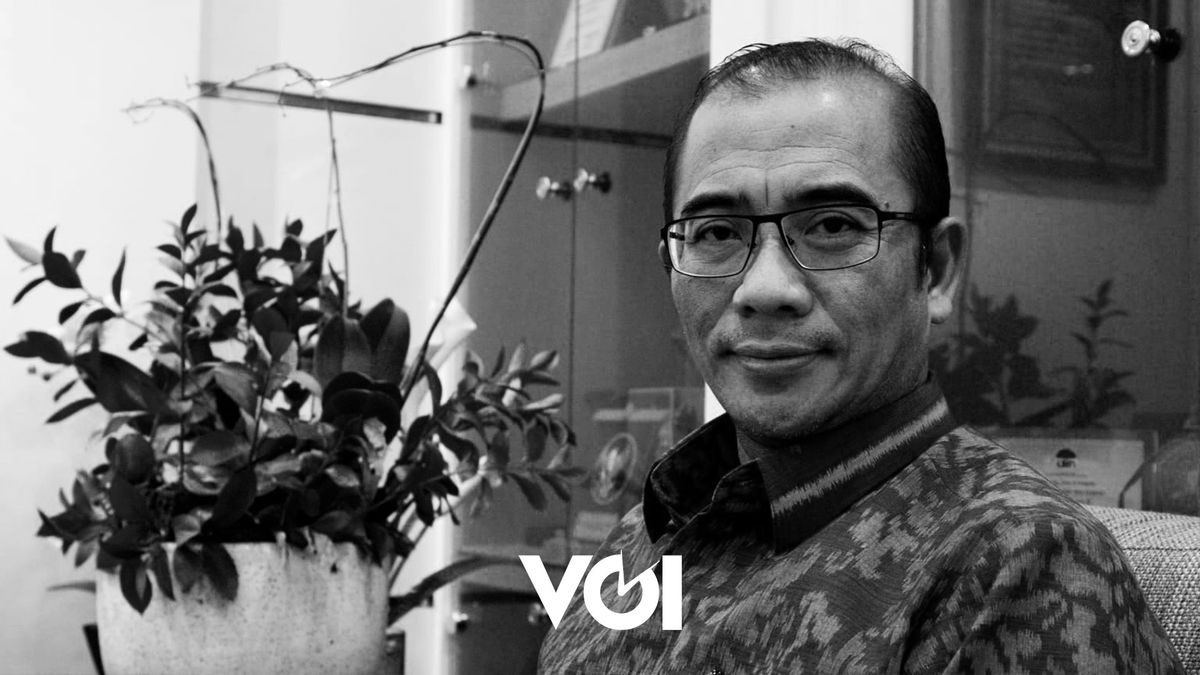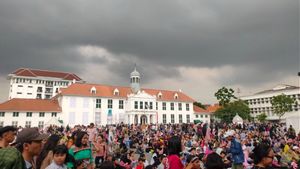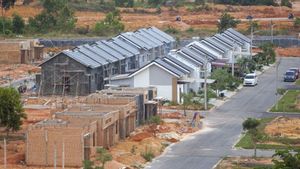Currently, Indonesia has entered the 2024 general election, aka the electoral period. However, according to the Chairman of the General Election Commission (KPU) of the Republic of Indonesia, Hasyim Asy'ari, SH, M.Sc., Ph.D., there are still some homeworks (PR) that still need to be completed. What are they?
***
The 2024 election has been agreed upon by the Indonesian House of Representatives, the government and election organizers; KPU and Bawaslu. The day chosen for voting is Wednesday, February 14, 2024. The General Election Commission (KPU) of the Republic of Indonesia as the institution that has the mandate to hold the polls followed up with steps in accordance with the instructions in Law No. 7 of 2017 concerning General Elections.
Elections, said the KPU chairman, Hasyim Asy'ari, SH, M.Sc., Ph.D., are an indicator of whether or not democracy is running in a country. Therefore, the election administration entrusted to the KPU must be carried out seriously and seriously. “One of the indicators of democracy in a country is regular elections. Elections are conducted in the context of the circulation and rotation of power. That is the importance of holding the election," he said.
Even though there was a discourse about delaying the 2024 election, the KPU did not budge. The countdown for the election has been installed in front of the KPU RI Building, Jalan Imam Bonjol, Menteng, Central Jakarta. Because there are recent developments regarding the existence of the Nusantara IKN and the formation of a new autonomous region (DOB) in Papua, this is still an obstacle and homework (PR) itself that must be resolved by lawmakers.
According to Hasyim, the revision cannot be done by them (KPU), but must be done by the legislators. This revision to conform to the time line that has been prepared by the KPU, must be carried out immediately. According to him, the revision must be done by the end of 2022 at the latest. "The revision of the Law for DOB and IKN Nusantara is at the latest by the end of 2022 if you want to use the 2024 election mechanism," he said.
The problem is that in February 2023, the next stage of the election is waiting, namely the Structuring of the Electoral District or Dapil, while in May 2023 the nominations have started. To pursue this, the legal umbrella must exist, at least by the end of 2022.
What Hasyim Asy'ari said is very reasonable. When the legal framework does not exist or is not ready, it will affect the preparation and time schedule for the election that has been prepared by the KPU. He received Iqbal Irsyad, Edy Suherli and Irfan Medianto from VOI for a special interview conducted at the KPU RI office some time ago. Here is the full excerpt.

The task of the KPU RI is very heavy, the 2024 simultaneous elections will be the largest in the world. How is the KPU's preparation ahead of the 2004 general election?
Although there are people who call the election a democratic party, I don't really fit the term democratic party. Sorry for the impression that the party was happy-happy, rah-rah, and so on. I prefer to call elections democratic work. Because this election must be carried out seriously, and seriously, this person is really trying to hold elections as an indicator of democracy. One of the indicators of democracy in a country is regular elections. The election was conducted in the context of the circulation and rotation of power. This is the most important thing to do.
In the Election Law No. 7 of 2017 it is determined that the stages of the election begin no later than 20 months before voting day. We have determined that the election will be on Wednesday, February 14, 2024. If it was withdrawn by 20 months, it would have fallen on June 14, 2022 yesterday. So that we are currently in the electoral period or the stages of the election.
What activities will the KPU carry out ahead of the 2024 election in 2022?
At least there are some activities carried out this year. First, August 1 to August 14, 2022 is the registration period for candidates for the 2014 General Election. After that, there will be administrative verification and factual verification. The climax is December 14, 2022, the determination of political parties participating in the 2024 General Election. In the law, it is stipulated that the determination of election participants is determined 18 months before the voting day. No later than 14 months before the voting day, there has been a determination of the political parties participating in the election.
Regarding preparation, the KPU as an institution has been preparing for this election for quite a long time. The previous KPU period (2017-2022) had prepared everything. The current KPU (2022-2027) continues what the previous KPU has done.
It has just been legalized for the new expansion area in Papua, and there is also IKN Nusantara, how does the KPU prepare everything?
There are two areas that have an electrical consequence. First, the formation of a new autonomous region in Papua, which was expanded and added a new province. Initially, the parent region of Papua was allocated 10 seats in the DPR RI. Then, 3 provinces were added to become 4 provinces. The allocation of seats is determined by the number of residents. So the existing population will be divided into the 4 provinces. As is well known, our electoral system is proportional. Our minimum proportional limit per Central Electoral District (DPR RI) is 3 to 10 seats. And for DPRD there are 3 to 12 seats. What does this mean, there will be a new electoral district (Dapil).
Second, initially the main area of the DPRD was only one, if it was divided into 4 provinces, it would require 4 DPRD. Third, if this is an autonomous region, there is a DPRD and the regional head is elected directly through the Pilkada. And there must also be 4 regional heads. The question is when it will be ready, what about the legal instruments. Structuring the electoral district for the DPR RI and the DPR Province, the authority lies with the legislators/lawmakers. Consequently, if this is to be filled by the results of the 2024 election, there must be a significant revision of the law. If there is no change, the electoral aspect will still follow the parent region. The experience of the expansion of North Kalimantan, when the elections were not ready, they still joined the parent region (Kaltim). After the completion of the new MD3 Law, it is divided proportionally.
What about IKN Nusantara?
IKN Nusantara province or not? If it's a province, is it an autonomous region or not? And there will be an election or not? According to the IKN Law, Nusantara IKN is a province. The filling of the head of IKN is not through direct elections, but is appointed by the President. As a consequence of the formation of the first IKN, the IKN Nusantara area is administratively included in East Kalimantan. Its territory is taken from two districts, North Penajam Paser and Kutai Kartanegara. As a consequence, the allocation for the DPR RI is also reduced for East Kalimantan. Later, the number of members of the DPR RI will be calculated for East Kalimantan and also for IKN Nusantara. Provincial DPRD is also reduced because most of the territory and population is divided for IKN Nusantara. With this condition, there must also be a review of the Law relating to East Kalimantan.
The second consequence with the existence of IKN Nusantara is Jakarta. With the existence of IKN Nusantara, there is a change and a transition period for Jakarta. The law on Jakarta must also be revised. There are two electoral aspects when the capital is no longer Jakarta. First, so far, vote counting for overseas voters has been included in the Jakarta II Dapil, after Jakarta is no longer the capital, whether the votes remain in the same place or are shifted to IKN Nusantara. This must be regulated in the law, not in the KPU or KPU regulations. After the capital moved to IKN Nusantara, what was the status of Jakarta? So there must be a revision of the law.
The revision of the law for the new autonomous regions and the Nusantara IKN is at the latest by the end of 2022 if you want to use the 2024 election mechanism. The problem is that in February the next election stage has been structuring the Electoral District or Dapil. The month of May has started the nominations. To pursue this, the legal umbrella must exist at least by the end of 2022.

For IKN Nusantara there will be a lot of new residents migrating, because the employees who move are not only alone, there are wives and children, how does the KPU anticipate this?
The KPU already has materials and studies for the revision of the law relating to the Papua New Guinea and IKN Nusantara. This is not at the KPU level, but at the lawmakers. We are ready to talk about the revision of the law relating to the expansion of new territories (DOB Papua) and IKN Nusantara, because we have already conducted a study.
So the legal basis must be settled first. If there is already a legal framework or the right legal framework. And the fulfillment of everything from personnel to administrative matters requires funds. So the affairs are long and complicated, interrelated with one another.
Learning from the last election, there were KPPS officers who were tired and died, what is the anticipation of the KPU so that this can be reduced?
There are several factors that happened to our KPPS officers who got sick or died during the previous general election. That it was the end of his life huh. But we must also believe in the power of God, that life, death, marriage, one's mate is part of the mystery of life that only God Almighty, Allah SWT knows. What needs to be considered is the human aspect.
There are several institutions that have conducted their own research on this matter. So they don't collaborate. There are from UGM, IDI and the Ministry of Health. It was found that the first tendency to die was those who were over 50 years old. Second, there are comorbidities; diabetes, hypertension and heart attacks.
Based on this, the KPU has modified the post-conflict local election some time ago. First, the maximum age for KPPS officers is 50 years. Both KPPS officers must be physically healthy and not in a state of contracting COVID-19 as indicated by PCR or antigen testing. We urge the government and local governments to pay attention to the health of these KPPS officers by using regional or state funds. We also require KPPS officers to have been vaccinated against COVID-19 at least twice. The reason is that the regulation regarding COVID-19 has not been revoked by the President, our status is still in a disaster emergency.
In the context of independent learning, we also expect campuses to assign their students to do internships as KPPS officers. So you don't have to go far, you can work in each student's village. The KPU benefits from getting young, well-educated workers. Students themselves get new knowledge about the ins and outs of voting. Because there is pre-service training.
What are the chances of using e-voting in our elections?
In terms of Indonesian technology, I think it is capable. But from a technical point of view, is there electricity in all areas? Are there all internet networks? And the most important thing is the political thrust. In the 2019 election, the Central KPU received a grant of a certain brand of computer. People then look for who the sole agent of the computer is and what party it is affiliated with. It turned out that after knowing they were affiliated with a certain party, people accused their computer system of having been designed to win a party. Pilgub DKI 2017 KPUD received computer grants either portable, desktop, etc. Because the incumbent forward charges appear it also appears, this is no attempt to win him over. Instead of reducing the legitimacy of the KPU and the legitimacy of the results of the gubernatorial election, I, who was the Jakarta Regional Coordinator at that time, asked for donations from a company's CSR to be returned.
In a democratically developed country, such as Germany, the election results via e-voting are annulled by their Constitutional Court. They have since abandoned e-voting. From various things this can be material for us. And most importantly, our Election Law has not yet regulated this e-voting matter.
In the past, elections using nails were considered primitive. Then change to stationery. But lately voting with nails is considered the most accessible in an election. So with all its limitations, this model can be accessed by anyone.
A person can not be tracked who he chooses in e-voting. Through technology it can be traced. If this is the case, the principle of secret elections is questionable. There are many things that need to be studied before using e-voting in our elections.
The question of how long the campaign period has been debated, how does the KPU view this?
Regarding the campaign period, 75 days have been agreed. For the KPU, it is not a matter of the duration of the campaign period. But the longer the campaign period, the more severe the conflict and the more difficult the management. Once the DCT is set, the campaign period begins. And the KPU must produce ballots and prepare other equipment, so that on D-1 voting everything is ready.
The question of the double DPT (Permanent Voters List) that has existed so far, can it be overcome by handing over access to Dukcapil by the Ministry of Home Affairs?
It is very possible, after the orderly administration gets better, the singular identity will be more precise and valid. It could be that our voter turnout is decreasing, because the fact is that the people are the same, but have more than one identity. The problem is that there is a real population and there is administrative data on the population. The pilkada experience in several places such as Papua, in Nabire in 2020 ago, the question was the number of voters in DCT. The case in Sampang 2018 is the same. So if there is coordination and agreement sharing with the Ministry of Home Affairs, in this case with the Director General of Dukcapil, the validity of voter data will be more guaranteed.
Hasyim Asy'ari, Around Indonesia Promotes 2024 Election

After his tenure as Commissioner of the General Election Commission (KPU) of the Republic of Indonesia 2017-2022 ended, Hasyim Asy'ari again volunteered as a candidate for commissioner. He passed the series of fit and proper tests well. He was re-elected as commissioner of the Indonesian KPU for the 2022-2027 term of service.
As the Chairperson and member of the Indonesian KPU commissioners, it is not easy to ask for time to meet and conduct an interview with Hasyim Asy'ari. The problem is that the last few weeks have taken up time to disseminate the general election and preparation for the 2024 election throughout Indonesia. Not only Hasyim, the other six KPU commissioners; Mochammad Afifuddin, Betty Epsilon Idroos, Parsadaan Harahap, Yulianto Sudrajat, Idham Holik, and August Mellaz, also performed the same task.
The man who was born in Pati, Central Java, March 3, 1973, is not new to the Indonesian electoral arena. He has been in this field since becoming Secretary of the Presidium of the Independent Election Monitoring Committee (KIPP) for the 1999 General Election, for Kudus Regency (1998-1999).
This father of three children's interest in the world of general elections has never been extinguished. He is consistent in the field of election administration and supervision. Though the opportunity to plunge as a politician is wide open.
But Hasyim is not interested in changing paths as a politician. He is consistent in his path of service as a lecturer, researcher and also an activist and organizer of general elections. Hasyim was elected as a Member of the General Election Commission (KPU) of Central Java Province for the period 2003-2008.

From Central Java the husband of Dr. Siti Mutmainah, SE, M.Sc., Ak., CA, continues to be consistently active as an election activist. He has served as Secretary of the Selection Team for Candidate Members of the Central Java Provincial Bawaslu for the 2014 Election, and also as a member of the Selection Team for Candidates for Members of the Regency/City Panwaslu in Central Java for the 2014 Election.
Big
The momentum to be involved in the RI KPU occurred when he became a member of the commissioner through the interim alternation (PAW) in the 2016 to 2017 period. At that time Hasyim served in the RI KPU because the KPU commissioner Husni Kamil Malik died.
Like a big fish that needs a large pond, KPU RI seems to be the right place for Hasyim to channel his potential and interest in the world of elections in Indonesia. After completing his term of service as a member of the interim replacement commissioner, he was re-elected as a commissioner of the Indonesian KPU for the 2017-2022 term of service.

When all members of the KPU for the 2017-2022 period retired, Hasyim again passed the fit and proper test for the candidate members of the KPU RI for the period 2022-2027. Among the members of the Indonesian KPU for the 2017-2022 period, only Hasyim Asy'ari was able to continue his service as a member of the Indonesian KPU for the 2022-2027 period. In this period, he was trusted as the Chairman of the KPU RI to replace the previous Chairman of the KPU, which was held by Ilham Saputra.
Armed with experience in the world of elections from the district level to the national level, he is now the captain of the "ship" named KPU RI. Great hopes are placed on the shoulders of Hasyim Asy'ari, the other six commissioners of the Indonesian KPU and the entire ranks of the KPU for holding simultaneous elections in 2024.
On various occasions Hasyim Asy'ari expects the involvement and participation of the Indonesian people in the general election. “Election is an institutionalization of participation in exercising the right to vote. This right to vote has a democratic character if it fulfills four principles, namely general (universal), equal (equal), secret (secret) and direct (direct),” said Hasyim Asy'ari when he was a resource person for the Focus Group Discussion (FGD) of the PPRA National Seminar. LXIII FY 2022, the National Resilience Institute (Lemhanas) of the Republic of Indonesia did not end last June as reported on the kpu.go.id page.
As the Commissioner and Chairman of the Indonesian KPU, Hasyim Asy'ari has the responsibility to make the 2024 election a success that is in sight. According to Hasyim, regular elections are a space for people to express their political aspirations. Besides that, it is also a space for the people to be directly involved in filling state political positions and as a means of controlling and evaluating the people towards state administrators in the past and the future.
“One of the indicators of democracy in a country is regular elections. Elections are conducted in the context of the circulation and rotation of power. That's why the election is held."
Hasyim Asy'ari
The English, Chinese, Japanese, Arabic, and French versions are automatically generated by the AI. So there may still be inaccuracies in translating, please always see Indonesian as our main language. (system supported by DigitalSiber.id)








